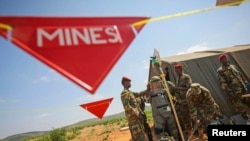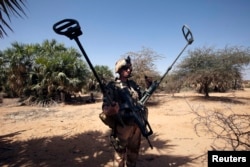GENEVA —
To mark the International Day of Mine Awareness and Assistance in Mine Action, the United Nations is calling for the elimination of mines and explosive remnants of war that threaten the lives and livelihoods of millions of people around the world.
The United Nations reports landmines affect 59 states and six other areas. Besides these weapons of war, the U.N. notes cluster munitions and other remnants of war also are threatening the lives and development prospects of many states.
The U.N. Mine Action Service, or UNMAS, operates in 18 countries to neutralize these threats so people can live in safe communities and rebuild their economies. The agency notes mine action involves more than removing landmines and explosive weapons of war from the ground.
It also makes it possible for peacekeepers to carry out patrols, humanitarian agencies to deliver assistance and for ordinary people to once again work in their fields without fear of being blown up.
UNMAS Director Agnes Marcailliou said UNMAS carries out de-mining operations in Mali, Somalia, Syria, Libya, Afghanistan and other countries. She said it supports peacekeeping operations in the Ivory Coast, or Cote d’Ivoire.
“When we were in Cote d’Ivoire to do mine action traditional, we were called on to help with the stockpiles of ammunitions and weapons they had," she said. "We identified over 50 storage facilities, which were at risk of blowing up or at risk of being looted. We have refurbished over 45 today…and we have come across stockpiles of old landmines they did not know that they had…We have done such a good job in Cote d’Ivoire that Liberia has asked us to assist them and we will start in July.”
Marcailliou said UNMAS now is looking at the stockpiles and ammunition in the Central African Republic to see how it can keep the citizens out of harm's way.
The International Campaign to Ban Landmines and Cluster Munitions reports much progress has been made in reducing the threat to individuals and communities since treaties banning these weapons came into force in 1997 and 2008.
Since then, it says hundreds of square kilometers of previously infested land have been cleared, tens of millions of stockpiles of antipersonnel mines and cluster munitions have been destroyed. Most importantly, it says the number of new casualties has dropped dramatically to fewer than 5,000.
UNMAS Director Marcailliou said Syria and Burma, also known as Myanmar, are two countries still using landmines.
“In Myanmar, which is one of the countries with the highest rate of casualties today on landmines, we have not yet been able to get a sense of the scope and nature of the problem-government included," she said. "And, landmines are being manufactured in Myanmar and they are being used pretty much by everybody today.”
UNMAS employs about 18,000 local people in 18 countries and spends about $250 million a year to carry out its mine action programs. The United Nations says global mine action saves lives, contributes to humanitarian relief efforts, to peace operations and it enables development. It says it remains committed to freeing the world from the threat of mines and other remnants of war.
The United Nations reports landmines affect 59 states and six other areas. Besides these weapons of war, the U.N. notes cluster munitions and other remnants of war also are threatening the lives and development prospects of many states.
The U.N. Mine Action Service, or UNMAS, operates in 18 countries to neutralize these threats so people can live in safe communities and rebuild their economies. The agency notes mine action involves more than removing landmines and explosive weapons of war from the ground.
It also makes it possible for peacekeepers to carry out patrols, humanitarian agencies to deliver assistance and for ordinary people to once again work in their fields without fear of being blown up.
UNMAS Director Agnes Marcailliou said UNMAS carries out de-mining operations in Mali, Somalia, Syria, Libya, Afghanistan and other countries. She said it supports peacekeeping operations in the Ivory Coast, or Cote d’Ivoire.
“When we were in Cote d’Ivoire to do mine action traditional, we were called on to help with the stockpiles of ammunitions and weapons they had," she said. "We identified over 50 storage facilities, which were at risk of blowing up or at risk of being looted. We have refurbished over 45 today…and we have come across stockpiles of old landmines they did not know that they had…We have done such a good job in Cote d’Ivoire that Liberia has asked us to assist them and we will start in July.”
Marcailliou said UNMAS now is looking at the stockpiles and ammunition in the Central African Republic to see how it can keep the citizens out of harm's way.
The International Campaign to Ban Landmines and Cluster Munitions reports much progress has been made in reducing the threat to individuals and communities since treaties banning these weapons came into force in 1997 and 2008.
Since then, it says hundreds of square kilometers of previously infested land have been cleared, tens of millions of stockpiles of antipersonnel mines and cluster munitions have been destroyed. Most importantly, it says the number of new casualties has dropped dramatically to fewer than 5,000.
UNMAS Director Marcailliou said Syria and Burma, also known as Myanmar, are two countries still using landmines.
“In Myanmar, which is one of the countries with the highest rate of casualties today on landmines, we have not yet been able to get a sense of the scope and nature of the problem-government included," she said. "And, landmines are being manufactured in Myanmar and they are being used pretty much by everybody today.”
UNMAS employs about 18,000 local people in 18 countries and spends about $250 million a year to carry out its mine action programs. The United Nations says global mine action saves lives, contributes to humanitarian relief efforts, to peace operations and it enables development. It says it remains committed to freeing the world from the threat of mines and other remnants of war.












